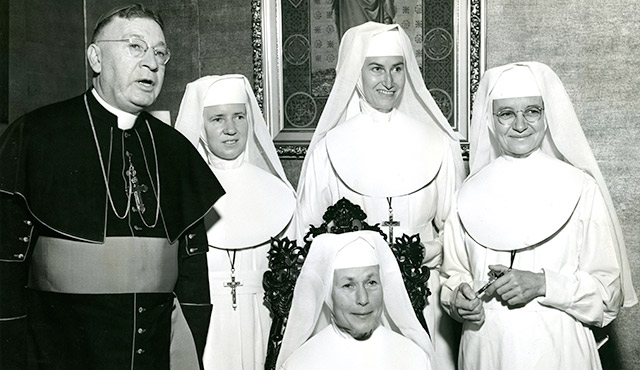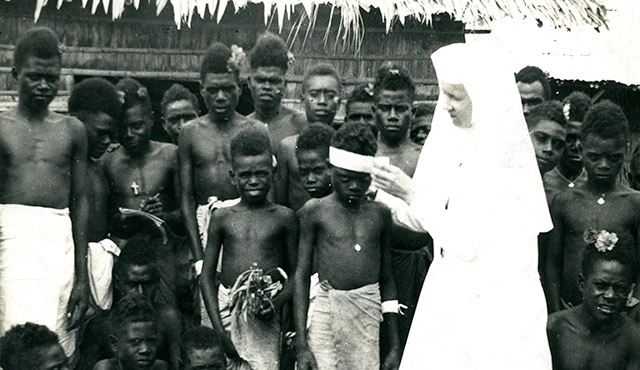A sister was recuperating from an illness in early 2016 at Regina Residence, the home for retirees of the Sisters of St. Joseph of Orange, when she felt useless and restless.
For Sister Eileen McNerney, that time turned into a months-long labor of love that, in November, resulted in the publication of a book detailing a fascinating and little-known story connected to the Dec. 7, 1941 bombing of Pearl Harbor.
For a little more than a year after the infamous attack that plunged the U.S. into World War II, four nuns from the Sisters of St. Joseph of Orange who were doing missionary work in the Solomon Islands were trapped behind enemy lines.
Their at-times harrowing experience, which culminated in their high-risk rescue by a U.S. submarine on Jan. 1, 1943 after they spent nine months hiding in the mountains on the island of Bougainville, is detailed in “Trapped in Paradise: Catholic Nuns in the South Pacific 1940-1943.”
The book is based on the journals of Sister Hedda Jaeger, who periodically mailed handwritten dispatches to superiors back in Orange.
Back in 2012, McNerney learned about the existence of the journals while helping to compile a book marking the 100th anniversary of the Sisters of St. Joseph of Orange.
While recuperating at Regina Residence, McNerney started the Jungle Journal Reading Club in March 2016.
Every Friday, about 30 retired nuns would gather and listen to McNerney, assisted by Sister Rebecca Rodriguez, read about 10 pages from the journals.
“I thought the older nuns would enjoy the journal because they knew these four sister better than I did,” says McNerney, 77, a nun for some 60 years. “Some of them couldn’t see, some were deaf, and some needed mobility aids to get around.”
During the weekly readings, the sisters — one as old as 102 — would indulge on coconut macaroons and other South Pacific-themed treats.
The reading group participants learned how to pray in pidgin English — which the four nuns in the South Pacific used, at times, during their missionary work, which included teaching, providing health care, and much more.
McNerney says the reading group turned out to be such a hit that sisters would often ask her: Hey, is this going to be a book?
In June, McNerney enlisted the editing skills of her sister, Maureen McNerney Habel, to help her pore over the journal and shape it into a book, which begins with the three-month journey of the sisters by boat to the small island of Buka, separated from Bougainville by a channel.
Along with Sister Hedda, who was from North Dakota, the other nuns who ended up in hiding after World War II broke out in the Pacific — aged 35 to 50 at the time — were Irene Alton, from Huntington Beach; Isabelle Aubin, from Massachusetts; and Celestine Belanger, from Ontario, Canada.
Sisters Hedda and Irene were nurses, Sisters Isabelle and Celestine teachers.
After the bombing of Pearl Harbor, the nuns were warned to leave but didn’t.
As McNerney points out: “A shepherd does not leave his sheep.”
Although none of the four sisters were hurt or taken hostage during their months in hiding (some Marist priests and nuns were killed by the Japanese on nearby Guadacanal), as Americans they were in danger. And their living conditions left a lot to be desired.
“Trapped in Paradise” is laced with humorous moments, like when the sisters chased down centipedes with a stick.
“They were deathly afraid of centipedes,” McNerney says.
Or when Sister Irene, with no formal training in dentistry, excised a bishop’s molar with help from Sister Isabelle, who spoke French and translated instructions to Sister Irene from a small dentistry book in French they found:
With a dexterous twist, (Sister Irene) succeeded in bringing out a three-root molar on the first attempt. Although the patient perspired, he didn’t even wince. The natives gazed in tense silence, then clapped and laughed as the tooth was triumphantly held aloft in the forceps.
The book also is tinged with the fear the nuns felt — none stronger than when they saw Japanese warships pulling into the harbor — and poignant scenes, such as when Sister Irene became distressed after witnessing a birth in which the baby didn’t survive.
Sister Irene also contacted the potentially fatal cerebral malaria but was saved by medicine administered by an Australian doctor. She was seriously ill for about six weeks.
Despite their fear of being discovered by the Japanese, and the hardships they endured, probably the most negative line in the book is:
Things don’t look too bright right now.
The most dramatic part of “Trapped in Paradise” is the account of the sisters’ rescue by submarine, and their return home:
The skyline of San Francisco gave us a feeling mere works cannot express. Everything we held dear seemed to be wrapped up in that foggy picture. We wanted to fold it up in our arms.
Remarkably, after the war, all four sisters returned to continue missionary work in the South Pacific — Sister Irene for 23 more years.
“I think they were filled with zeal,” McNerney says.
McNerney, who sits on the board of trustees at Mission Hospital in Mission Viejo, says “Trapped in Paradise” contains many themes that remain very relevant today.
“We are here to care for each other,” McNerney says. “These people [the Solomon Islands residents] were sick and uneducated, and needed help. It’s that whole thing in Matthew 25,” she adds, referring to Matthew 25: 35-36:
For I was hungry and you gave me food, I was thirsty and you gave me drink, a stranger and you welcomed me, naked, and you clothed me, ill and you cared for me, in prison and you visited me.
“These were really corporal works of mercy they were performing,” McNerney says of the nuns.
The reception to “Trapped in Paradise” has been good, McNerney says, with more than 1,000 copies sold to date.
Over two recent weekends, McNerney and her sister sold 200 books to parishioners of Holy Family Catholic Church in Seal Beach.
“We are very happy with the great reception the book is getting,” McNerney says.
“Trapped in Paradise” is available at csjorange.org, amazon.com and the Bowers Museum in Santa Ana (bowers.org). The cost is $15.95. Proceeds benefit The Soldiers’ Project in Los Angeles, which provides mental health services for veterans of the Iraq and Afghan wars, as well as the Sisters’ ministries in Tijuana and El Salvador.


